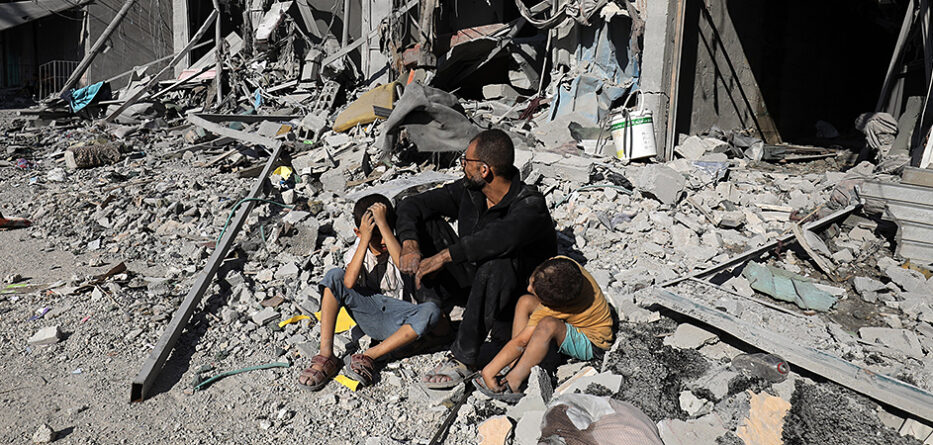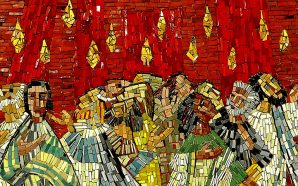Homily for the 30th Sunday in Ordinary Time, Year A
Readings: Exodus 22:20-26; Psalm 17(18):2-4, 47, 51; 1 Thessalonians 1:5-10; Matthew 22:34-40
29 October 2023
When asked by the Pharisees to name the greatest commandment, Jesus marries love of God and love of neighbour: ‘you must love your neighbour as yourself.’
The week started with the publication of the letter by some of the Indigenous leaders of the ‘YES’ campaign in the failed referendum. They said: ‘The truth is that the majority of Australians have committed a shameful act whether knowingly or not, and there is nothing positive to be interpreted from it.’[1] Their anger, pain, and distress are palpable. By week’s end, the Prime Minister was trying to put the loss into some historical perspective. Perhaps it was not so much a matter of the people’s shame, but the folly of our politicians. After all, no referendum has ever succeeded without bipartisan support. Being asked about the loss while in Washington, Mr Albanese explained ‘that it is difficult to change the Constitution in Australia. That in order to get people to vote “Yes” for constitutional change, you have to convince people of all the merits, and in order to get people to vote “No”, you only need to raise doubt.’ He cited the history of other proposals: ‘And I have said to people that there are things that have been defeated like payment of just compensation, four-year terms, recognition of local government, in order to try to put it in context — that it is a difficult change.’[2]
LISTEN: https://soundcloud.com/frank-brennan-6/homily-291023
Asked to reflect on the referendum loss in my last interview on the matter, I said: ‘Look at that letter that’s come out from the Aboriginal leaders today – the anger, the disappointment, the despair. These are the people we’ve got to be able to work with well and constructively and in trust in order to close those gaps. And so much of what Noel Pearson detected as love in the air during the last week or two of the campaign, that’s evaporated. Why? Because basically Australians have voted as they’ve always voted in referendums. They’ve basically said that we need to be sure that either there is a crisis or that there is consensus among our politicians. And the great tragedy of this is that in the end all you’ve got to do is listen to people at the family barbecue nowadays. I mean those who blame Albanese are those who are the Tory voters; those who blame Dutton are those who are the Labor voters. And that sort of partisanship should never come into a referendum. Once it does, the referendum is lost completely.’[3]
Unfortunately, the proposed constitutional change was too loosely worded and the process for seeking bipartisanship non-existent. The major challenge for the country in the future is according First Australians agency and self-determination while remaining true to the undoubted rules for constitutional change. We in the Church need to get better at calling government to account when they breach such rules or sell short the First Australians of their legitimate entitlements.
There will be ongoing debate about shame and blame. But we need to recommit to that love of neighbour which can herald a new beginning in justice and reconciliation.
A couple of days after the publication of the Aboriginal letter, I was privileged to join a group of 20 people at Australian Catholic University meeting with Katalin Novak, the President of Hungary. The 46-year-old mother of three was accompanied by her bishop from the Reformed Church in Hungary. She addressed us and answered questions for well over an hour, and without a note. She is a great advocate for laws and policies aimed at encouraging a higher birth rate in view of Europe’s below replacement birth rate. She spoke of the complexity of foreign relations especially with the Ukraine-Russia conflict. Hungary, though dependent on Russian gas during the winter, is sympathetic to the Ukrainians, two million of whom have fled into Hungary during the war. With disarming simplicity and a charming smile, she told us, ‘Faith and children help you make the right decisions.’ She has a good relationship with Pope Francis with whom she speaks regularly on the phone, and in Spanish. At the end of her presentation, she told us about the moment she took over the presidency two years ago. She was left in an office briefly on her own. So she called her husband. He was too busy to talk. She tried to call her best friend but she was not available. She said, ‘But then I realised I was not alone. I always have someone with me.’ Her simple profession of faith was inspirational.
The Hungarian president’s hopeful message resonated with the note of hope in the despairing letter from the Aboriginal leaders: ‘We have faith that the upswelling of support through this referendum has ignited a fire for many to walk with us on our journey towards justice.’
All this is playing out against the backdrop of the appalling situation in Israel and Gaza. None of us has an answer to the escalating violence and killing of innocent non-combatants in this war. The wanton terrorism of Hamas will be avenged and Israel will do all in its power to degrade Hamas as a military and political force in Gaza. But with Hamas being embedded amongst so many innocent Palestinians in confined spaces, civilian casualties will be inevitable. Political philosopher Michael Walzer has rightly said, ‘If terrorists use other people as shields, then anti-terrorists have to find their way around the shields’.[4]
As the conflict continues, the long term and continuing injustices suffered by Palestinians on the West Bank as well as Gaza will fuel resentment of any poorly targeted Israeli interventions. It is now almost 20 years since the International Court of Justice decided by 14-1 that the wall ‘and its associated regime gravely infringe a number of rights of Palestinians residing in the territory occupied by Israel, and the infringements resulting from that route cannot be justified by military exigencies or by the requirements of national security or public order.’[5] Even the one dissenting judge, Judge Thomas Buergenthal, accepted that ‘the wall is causing deplorable suffering to many Palestinians living in that territory’. He insisted that ‘the means used to defend against terrorism must conform to all applicable rules of international law and that a State which is the victim of terrorism may not defend itself against this scourge by resorting to measures international law prohibits.’[6] Back in July 2004, Australia was one of only six countries to dissent from the resolution of the UN General Assembly carried 150-6 with 10 abstentions demanding ‘that Israel, the occupying Power, comply with its legal obligations as mentioned in the advisory opinion’.[7]
None of us has the answers to the political, military and moral challenges erupting in the Middle East these days. Praying earnestly for those carrying the heavy responsibility of deciding how to avenge and degrade Hamas while avoiding a conflagration going well beyond the borders of Israel and Gaza, we recall those words of the Lord spoken to Moses in today’s first reading from Exodus:
‘Tell the sons of Israel this: “You must not molest the stranger or oppress him, for you lived as strangers in the land of Egypt. You must not be harsh with the widow, or with the orphan; if you are harsh with them, they will surely cry out to me, and be sure I shall hear their cry; my anger will flare and I shall kill you with the sword, your own wives will be widows, your own children orphans.’
Contemplating the breakdown in reconciliation here at home and the despair in the Middle East, we can pray together with the Hungarian President Katalin Novak:
I love you, Lord, my strength.
I love you, Lord, my strength,
my rock, my fortress, my saviour.
My God is the rock where I take refuge;
my shield, my mighty help, my stronghold.
The Lord is worthy of all praise,
when I call I am saved from my foes.
I love you, Lord, my strength.
Long life to the Lord, my rock!
Praised be the God who saves me,
He has given great victories to his king
and shown his love for his anointed.
I love you, Lord, my strength.
Fr Frank Brennan SJ is the Rector of Newman College, Melbourne, and the former CEO of Catholic Social Services Australia (CSSA). He was appointed a peritus at the Fifth Plenary Council of the Australian Catholic Church. Fr Frank’s latest book is An Indigenous Voice to Parliament: Considering a Constitutional Bridge, Garratt Publishing, 2023.
[1] https://ugc.production.linktr.ee/2e09849a-25e6-4743-8317-e33dfb437728_Statement-for-our-People-and-Country.pdf
[2] https://www.smh.com.au/politics/federal/good-on-you-for-having-a-try-albanese-quizzed-about-the-voice-in-us-20231027-p5efox.html
[3] See https://www.youtube.com/watch?v=8R_4rQaNctQ&t=19s
[4] Michael Walzer, Thinking Politically, Yale University Press, 2007, p.276
[5] Legal Consequences of the Construction of a Wall in the Occupied Palestinian Territory, International Court of Justice, Advisory Opinion, ICJ Reports 2004, p. 136 at para. 137 available at https://www.icj-cij.org/sites/default/files/case-related/131/131-20040709-ADV-01-00-EN.pdf
[6] Judgment of Buergenthal J, para. 2 available at https://www.icj-cij.org/sites/default/files/case-related/131/131-20040709-ADV-01-05-EN.pdf
[7] A/RES/ES -10/15.








